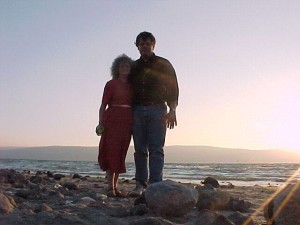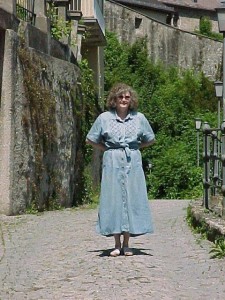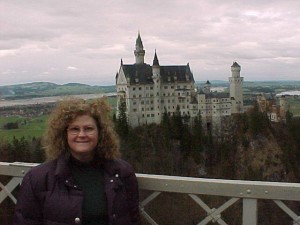Today’s Spotlight is from Gail. She has a unique perspective due to her training and occupation as a therapist in addition to having a worldwide perspective.
What are your early memories of church?
My very first memory of church was of sitting in the bishops’ office with some of the members. One of them gave me a Brach’s Butterscotch hard candy. I was hooked and it is a happy memory. My dad was the bishop in Alameda and I have fond memories of that area.
We moved to Lima, Peru when I was about three and a half. We were there for three years while my parents served as the Mission President. The memories of living in a third world country are both scary and delightful. The people were wonderful but the feeling of not being safe was always an issue.
My mother could see that the R.S. curriculum was not working for the Peruvian sisters. (she had real responsibilities with an official office) She got approval from the General R.S. board to write new and improved lessons that would be geared towards the members in the mission. This was before the R.S. was handed over to the men. Yes, women did it well.
When we returned home to the states my mother was called as the RSP for our ward and I saw women doing very cool stuff. She ministered to the sisters in the ward visiting some in mental hospitals, loving their children and including them so that they would not feel alone while their mother was away. She organized the bazars, made goods to be sold there and taught the principle of diversity.
Then it all went away. Women and the church became something else.
What did you learn about your heritage?
I was born into a multi-generation church family on my mother’s side. My paternal grandfather was a convert and married a woman with pioneer heritage. It was the women who I learned about.
My great aunt (paternal) lived in Berkeley and was a public historian. I learned about history from her. I learned to want to learn more about my world.
On my mother’s side I was told the stories of our pioneer women and learned of their strength. I never met my grandmother but learned from my mother and my aunts of her strength and courage and that women gave blessings. I heard that growing up from a young age. It was always there.
What have you learned from your adolescent days in the church?
I learned about the authority and the patriarchy. I learned that what was offered to me as a disabled young woman wasn’t enough. I learned that I was supposed to marry and have a family and that did not work in my life. I learned futility. I slipped away into minimal attendance. There wasn’t much for me in the chapel or the other rooms of the church. But I had the gospel and that was what mattered.
What did you learn about the priesthood?
This is where things get tangled up. I learned many things. I know of the women who gave blessings. My father gave me blessings. I had witnessed first hand in my life how powerful the gift of healing could be. I always knew I had the right to call on that power and I did. I let things grow within my soul. When my father passed when I was 31 I felt alone with the priesthood and it was after his passing that I began to rethink and to understand the power I had.
When I think more about it though I had felt a nudge on my mission and I had felt the in-equality present. I had felt the need for the sisters in the field to minister more powerfully. I kept quiet as I was already making waves in other ways. I served in Georgia and every presidents interview my MP got a mouth full about the racism in the church.
What did you expect to see when you moved to Europe?
I married in December of 1998 and we moved here three weeks later. The ward in Munich was filled with military and other expat families. It was pretty much what I had been led to believe I’d see. There were educated people who were doing their own things outside of their country of origin. Munich was nice. I thought it would continue. I didn’t have much contact with the German members.
I need to state that this is now home. While I might have U.S. citizenship I haven’t lived there for 17 years. As of now we aren’t returning to the states.
Women in Europe have things that LDS women in the U.S. may not have. Being a part of the church might be a demotion of sorts. When I asked some of my friends about feminism their response was “we don’t need that” and I began to learn that they have what we fight for. When women step into a church however they are stepping back in time.
When it comes to putting up a profile here we are isolated. We might be the only woman from our country; we are sticking out because there just aren’t that many of us that see the need for OW. The stories of my European sisters are of courage. I feel honored that they have allowed me to share with them.
What has living in different countries been like?
We transferred to The Netherlands and were in the eastern part of the country and the Expat/International ward was a two hour drive one way so we attended the local unit.
We’ve been in country for almost 15 years. We are now in the western part of the country. Most of our time in country we have attended local units. I have learned so much.
Women work and few are stay at home moms. Some of the women have to work just to earn the money for the families they have. They would be considered lower middle class in the U.S. Others want to use their education and plan on doing so from their adolescents. But there is this schism that I’ve had to learn to understand.
Members here tend to compartmentalize the church. In the states church culture intrudes into life and if you are in Utah the battle to keep it out of your life is even greater. I was raised in California so I didn’t have to deal with that aspect of the church culture. HERE? This is different.
People tend to make fewer friends but the friends they have are good friends. People don’t talk about religion and your colleagues are colleagues and when you leave the office you leave that there.
Life is about balance. I’d say the majority of the units here are branches and not small wards. (Wards are about 125 members) People tend to keep their heads and not get over involved in any one thing. If anything church is further down on the list. That being said not all members hold this attitude. The members in our branch are not well educated and struggle with understanding many concepts of gospel living. They have good hearts and really try hard to be good followers of Christ.
The unit is small and there aren’t enough men to do the priesthood work. There are about 30 members that attend. The stake has chosen to import priesthood to fill the positions that need to be filled in order for the branch to function. I was told that I don’t have callings because I’m a woman with a disability and my Dutch is not at the native level. The truth according to a Dutch guy I know is this: I’m a threat and as long as leadership is threatened by me my skills won’t be used. I feel awful about this whole situation and it shouldn’t be allowed so I find other ways to serve out of the church.
The women have been my greatest challenge. How I wish I could tell them about my heritage and that it really is a good thing to ordain women. They are afraid of anything that doesn’t come out of a manual. I think this is due more to lack of higher education and learning.

What makes you sad about the current situation in church?
I’m sad that men are burdened by the lack of inequality and that there is a lack of role expansion for them. How grand it would be to see men have options for development as nurtures and women have the opportunity to serve in the roles that they are capable of.
It bothers me that brilliant leaders are kept on the sidelines while mediocre stand-ins are forced into service when they might be off performing works of greatness with their children.
I am saddened and angry that women are told their divine role is to be a mother in this life, and if they are not able to be mothers that they are patted on the head (by men) and told to not fret because you will have that experience in the next life. And then they are injured in countless ways and set aside. I am angered by the fact that there is the “married club” and the “mother club” and that women can be left out of both of these clubs and it can be traumatizing and hurtful and that this issue is not addressed.
I’m sad that women who don’t have priesthood in their homes are seen as less than. They are made to feel as if here they cannot serve as the providers that this unique form of nurturance can provide. They are forced to turn to men who may lack in understanding their needs and challenges. They are made dependent on a male when what they might need is the power of the feminine.
I’m angered that men will give counsel to women when they fail to understand the issues. It saddens me that women take the counsel to to the men being authority figures.
I’m disappointed and angered that I can be told that as a woman of strength and a woman with a disability there is not a place for me in this church.
My gay family members left the church because there was not a place in the tent for them and this is uncalled for. I’m offended that men and women of color have been marginalized and treated condesendilngly.
What are your hopes for the future in the church?
Inclusiveness!!! OH I want to see this happen.
I want to see women standing tall and proud and not feeling like they have to hide the fact that they give blessings in the home. I want to see the sisterhood grow. I want to reclaim something that was lost.
I want to see every member in the church serve with joy and delight in the fact that their talents are being used to their full potential.
I hope to see my disabled sisters and brothers take healthy places within the church.
I want to see SLC understand that the gospel is the pure message of love and inclusion and that culture is how we celebrate our unique selves. I want to see an end to the exporting of Americanisms. I want and hope to see my Latin friends thrive, my European friends grow, my American friends and family understand.
I want to enlarge the tent and open up extended room for everyone that feels that this is their tribe.
What will have to occur for women to be ordained?
The doctrine is going to have to change and there is going to have to be some re-education. The Old boy club is going to have to bite the dust. The marriage and mommy club will need to be replaced with an identity that allows for women to be recognized for their talents, skills and desires.
Section 132 will have to be done away with. The church will have to come to terms with the polygamy issue as not divine. This will open up the way for women to have a full equality. This will involve rethinking our theology.
The church is going to have to replace the old boy network with a new way of doing business. This means that in primary boys will not have privilege. At age 12 they will not be ordained as deacons. The budgets for both boys and girls will equalize. Young women will be allowed to explore their identities in the same manner as boys and young men. Ordination will occur in both genders as they step up and show by their merits that they understand the responsibility they are taking on: In other words no more social ordination.
When you really think about it what we are asking for is a remaking of how things are done in the church and in homes. We are asking for more substance, more focus on Christ, and more unity. When I think about what OW is doing I am awed.
This means that we have serious work to do to get ready for the change we are seeking.
Women in the church are going to have to give up something marginalizing for something expansive. This is what will take the real effort and time. Our heavenly parents may be ready for this to happen but are we ready to do the hard work to make this happen? This is where I’m putting my thought, time and effort.
I am excited for the future but I’m also focused on the present and raising awareness. It will be a moment to to rember when the revelation is given. Where will you be and what will we each do?
Gail is a therapist who works both online and face to face with clients. You can find her at MMHA (Mormon Mental Health Association) http://www.mormonmentalhealthassoc.org/ where she is listed in the California section and hopes soon to add the Netherlands listing. She also blogs about disability issues at: https://agiftofbeingheard.wordpress.com/







